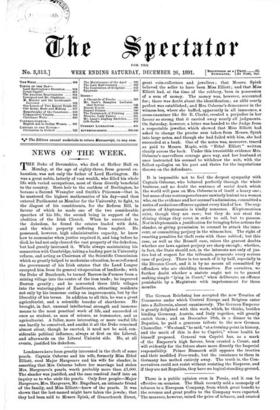NEWS OF THE WEEK.
THE Duke of Devonshire, who died at Holker Hall on Monday, at the age of eighty-three, from general ex- haustion, was not only the father of Lord Harlington. He was a great noble, latterly of vast wealth, who filled his whole life with varied occupations, most of them directly beneficial to the country. Born heir to the earldom of Burlington, he became a Second Wrangler and Smith's Prizeman—that is, he mastered the highest mathematics of his day—and then entered Parliament as Member for the University, to fight, to the disgust of his constituents, for the Reform Bill, in favour of which he made one of the two considerable speeches of his life, the second being in support of the abolition of the Irish Church. When he succeeded to the dukedom, he found the estates loaded with debt, and the whole property suffering from neglect. He possessed, however, high administrative capacity, he knew bow to economise when justice required it, and long before he died, he had not only cleared the vast property of the dukedom, but had greatly increased it. While always maintaining his connection wiih Cambridge, taking a leading part in University reform, and acting as Chairman of the Scientific Commission which so greatly helped to modernise education, he so reformed the government of his Irish estates that the Land League excepted him from its general vituperation of landlords ; with the Duke of Bnccleuch, he turned Barrow-in-Farness from a mining village into the centre of the iron trade ; he improved Buxton greatly ; and he converted three little villages into the watering-place of Eastbourne, attracting residents not only by his immense outlay on improvements, but by the liberality of his terms. In addition to all this, he was a great agriculturist, and a scientific breeder of shorthorns. He brought, in fact, unusual intellectual strength and immense means to the most practical work of life, and succeeded at once as student, as man of science, as ironmaster, and as agriculturist. A fuller, more interesting, or more useful life can hardly be conceived, and amidst it all the Duke remained almost silent, though he exerted, it need not be said, con- siderable political influence, always at first on the Liberal, and afterwards on the Liberal Unionist side. He, at all events, justified his dukedom.


































